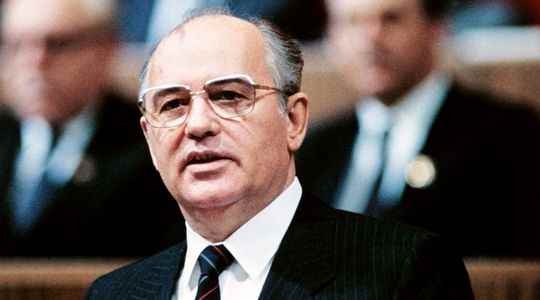In the West, the announcement of Mikhail Gorbachev’s death on Tuesday August 30 sparked a shower of tributes. But the communist leader – Nobel Peace Prize in 1990 for his contribution to the reduction of East-West tensions – was a man with complex motivations, who also had his dark side. The reforms carried out by Gorbachev were above all intended to strengthen the USSR, explains the historian specializing in Russia Françoise Thom. Maintenance.
L’Express: The memory of Mikhail Gorbachev is widely hailed in the West today, but what were his gray areas?
Francoise Thom: We must not forget that he was above all a communist apparatchik. Gorbachev saw things through the prism of the maneuvers between the different factions of the party, and had the main objective of strengthening his own position. This is what led to the contradictions in his policy, and ultimately, what ruined him. He could not follow a coherent line and oscillated between a policy of reforms and openness, then a rapprochement with the conservatives of the Party during the rise of Boris Yeltsin.
There is also a form of misunderstanding vis-à-vis the major reforms that Gorbachev carried out. The first reason why he launched perestroika and glasnost was a desire for power, because he saw that the Soviet military potential was left behind by the United States and the NATO countries. Less than a desire to improve the well-being of the population, it was this awareness of the obsolescence of the Soviet system that motivated its reforms. There was behind a desire to strengthen the USSR, and we can clearly see this with the opening of the archives.
So he didn’t really want the end of the USSR…
Not at all. He did not want the fall of the USSR, quite the contrary. Its original goal was to reform the system in a way that would make it more efficient and able to compete with the West. But once this impetus for change was given, he suffered more from the process of dislocation of the USSR than he really wanted.
The Soviet Union was then financially desperate, and he simply took note of this collapse of the communist bloc. Gorbachev accepted the dismantling of the Soviet bloc, but fundamentally, if we look at the minutes of the Politburo meetings, which are accessible today, we realize that this was very far from his original intentions.
What is Gorbachev’s real political record?
In matters of domestic politics, one of the essential points is glasnost. Its merits should not be minimized: the political prisoners were released in 1986, the political persecutions ended, and Russia was free as it has rarely been in its history. It continued under Boris Yeltsin, before disappearing under Putin. We can only salute the effect of this reform of Gorbachev. We can also point out that Gorbachev had little taste for violence, and that, from this point of view, he is an exception among the Russian and Soviet leaders.
Regarding foreign policy, Gorbachev’s goals were broadly the same as those of his predecessors. A detail that illustrates this continuity, he did not hesitate to use the energy weapon against a country that wanted to get out of Moscow’s orbit. In the spring of 1991, he thus implemented a gas embargo against Lithuania, when the country wanted to declare its independence. Moreover, Gorbachev’s ambition was to drive the United States out of Europe, and to build a German-Soviet axis, which would give the USSR the dominant position on the Old Continent. But he failed to realize this project, because of the political and economic collapse of the USSR.
Why is he so unloved by Russians today?
The main reason is that the Russians blame him for the collapse of the communist bloc and the USSR, as well as the loss of power associated with it. But in reality, Gorbachev is not responsible for this crisis of the regime, which existed before he took office, and became evident when he came to power.
